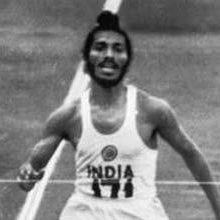MILKHA SINGH- ‘THE FLYING SIKH’

The legend of Milkha Singh has survived more than five decades and continues to be one of the most inspiring stories in Indian sports.
For the record, the legendary athlete who was orphaned during the Partition riot, was introduced to the sport while serving in the Indian Army. He was the first Indian athlete to win an individual athletics gold medal at the Commonwealth Games, a record which remained intact till 2010. He represented India in three Olympics from 1956-1964. He was awarded the Padma Shri, India’s fourth-highest civilian honour, in recognition of his sporting achievements.
The race for which Singh is best remembered is his fourth-place finish in the 400 metres final at the 1960 Olympic Games in Rome, which he had entered as one of the favourites. He led the race for some time before easing off, allowing others to pass him. Various records were broken in the race, which required a photo-finish and witnessed American Otis Davis being declared the winner by one-hundredth of a second over German Carl Kaufmann. Singh’s fourth-place time of 45.73 became the Indian national record and held for almost 40 years. He won four gold medals in the Asian Games from 1958-1962 in the 200m, 400m and 4X400m relay.
Arguably, Milkha Singh stands amongst the tallest icons of the country. Like the great Muhammad Ali, the ‘Flying Sikh’ overcame numerous obstacles outside the sports field and rightly shines as one of the brightest stars of Indian sports.
Extracts from one of the most insightful interviews of the ‘Flying Sikh’:
Q. Tell us something about your training method?
I used to train for about five to six hours daily. In the morning I trained for two to three hours. Very often, I went along with the distance runners for a cross-country run. This was to build up my stamina and for general physical fitness. In the evening I devoted two to three hours on the track, doing repetition runs, repeating 200m and 300m, etc. It was a simple training programme, but done with concentration and dedication. In fact, I tried so hard that sometimes I found it difficult to walk back to my barracks.
Q. Where did you pick up this type of tough training…the intense concentration?
It was at the Melbourne Olympics in 1956. As you know I was a surprise selection as I stood first in the trials, beating the national champion and other leading contenders. At Melbourne, I was determined that I should learn something that I could take back to India. I met Charles Jenkins, who won the gold in 400m, and many others. From them I learnt that the secret of success was hard work and dedication. I never forgot that.
Q. You had some classic races against Abdul Khaliq, the star sprinter of Pakistan. Any memories?
Yes, twice I met Abdul Khaliq in the 200 metres. He was a great sprinter and a great sportsman. My first encounter was at Tokyo Asiad 1958. I had won the gold in 400 metres and Abdul Khaliq had won the gold medal in 100 metres. It was an open talk that whoever won the 200 metres would win the honour of being ‘Asia’s best Athlete’. I was fortunate to win the gold medal in a close finish.
Q. What about your race in the Rome Olympics? There were so many speculations about why you lost the medal?
When I went to Rome I was considered the favourite by many experts. Many Indians had even placed heavy stakes on my winning the gold. In the final, however, I made a tactical blunder, which, I cannot ever forget. I started the race very well and was leading at 250 metres. A strange thought came to my mind…‘am I running too fast? Will I be able to finish the race with this speed?’ So I slowed down and dropped my speed and the rhythm with which I was running. As you know once you drop the rhythm, it is hard to regain it. The other athletes who were trailing overtook me and I was left yards behind them. I went mad, and tried to cover up, but it was too late. I lost the bronze medal to Malcolm Spence of South Africa whom I had beaten in the 1958 Commonwealth Games. The thought that I lost a medal in the Olympics in this manner still haunts me. It was the biggest blunder of my sports career.






